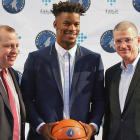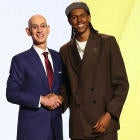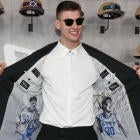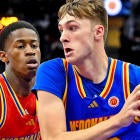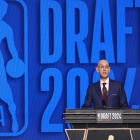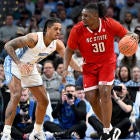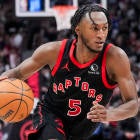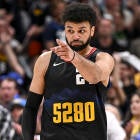Tony Allen agreed to a one-year, veteran minimum contract with the New Orleans Pelicans on Monday. Defense may be appreciated more now than it was 10 years ago, but it will never be fashionable. Compared to the other 50 percent of basketball, it is not as easy to measure, not as glamorous and not as fun. Allen and Luc Mbah a Moute, who signed the same deal with the Houston Rockets in July, may tell you that getting buckets is still what gets players paid.
It's worth noting, though, that Allen -- the No. 25 pick in 2004 -- is entering his 14th season, and Mbah a Moute -- the No. 37 pick in 2008 -- is entering his 10th. Defense may not get you a max contract, but it does help you stay in the NBA. With that in mind, let's try taking a look at this offseason without even mentioning points. Here are 10 questions about the changed landscape of the league that only concern defense.
1. Have the Rockets changed their defensive identity?
Houston was not the train wreck many expected it to be on defense last season, finishing 18th in defensive rating and winning 55 games. Assistant coach Jeff Bzdelik, essentially the team's defensive coordinator, is surely ecstatic about the way the front office has reshaped the roster since then. As tenacious as Patrick Beverley is defensively, Chris Paul is even better. P.J. Tucker, recruited by Paul in free agency, immediately joins Beverley and Vernon Maxwell on the list of toughest Rockets ever. Tucker and Mbah a Moute are never going to be seen as transformative players, but together they make Houston much more versatile. Nobody can have enough long-armed players who can guard multiple positions, and if the Rockets end up facing the Golden State Warriors in the conference finals, they'll have two more of those guys (in addition to Trevor Ariza, of course) to throw at Kevin Durant and Klay Thompson. In the months leading up to that potential matchup, Houston's biggest challenge will be showing the rest of the league that is now a physical and focused defensive team.
2. With George and Patterson, are the Thunder back on track?
Oklahoma City was 10th in defensive rating last season, a fine mark but still a far cry from its heyday as a top-five defense built on length and athleticism. Durant and Serge Ibaka aren't walking through the door, but this next season's iteration of the Thunder has a chance to rejoin the league's elite when it comes to getting stops. The combination of Paul George and Andre Roberson is as imposing as it gets on the perimeter, and the savvy Patrick Patterson should shore up a lot of the problems that came with starting rookie Domantas Sabonis most of last season. It would have been nice if the Thunder had somehow managed to retain Taj Gibson, but this team should still be able to cover lots of ground and switch most screens with ease. Remember how fearsome they looked when they were clamping down and turning defense into offense against the Warriors in the 2016 playoffs? They need to aspire to that sort of style, even if the personnel is different.
3. Are the Wolves truly a Tom Thibodeau team now?
Familiar faces Jimmy Butler and Gibson will help their former coach in Chicago try to turn the young Wolves into a well-oiled machine on defense. Thibodeau had serious problems in that regard in his first season in Minnesota, constantly preaching the importance of communication and precision while seeing relatively little in terms of results. Everybody knows what Butler and Gibson will bring, but the real test will be how much their intensity rubs off on others. Karl-Anthony Towns made strides defensively over the course of his second season, but should be held to a higher standard because he has the tools to be one of the league's best defenders. Andrew Wiggins has become something of a punching bag among the basketball intelligentsia because of his poor advanced statistics on defense, and he has serious deficiencies when it comes to effort and focus away from the ball. If they struggle, youth no longer will be an excuse.
4. Does Jae Crowder fix the Cavaliers' versatility problem?
Cleveland didn't lose to Golden State simply because of firepower. The Warriors were world-class at both ends of the court, and the Cavaliers never could credibly make that claim. Rumors about trading Kevin Love, the criticism of the aging bench and the doubts about Cleveland having a better chance next season arose because they lacked defensive versatility. Before and after David Griffin's exit, the front office tried to trade for a star like Butler or George to fundamentally change the way the Cavs would look on defense. Those trades didn't materialize, but getting Crowder in the Kyrie Irving deal was the next-best thing. Crowder might have slipped a bit as an individual defender last season, but still graded extremely well statistically. They needed a guy like him as much as any team in the league, and their best lineups almost certainly will feature him at small forward and LeBron James at power forward. It isn't clear that Crowder can turn Cleveland into a consistent defensive team, but simply raising its ceiling could be enough.
5. Could the Jazz be even more stingy this season?
The departed Gordon Hayward is an excellent defender, but Utah may have actually improved on defense over the summer. It finished third in defensive rating last season despite significant injuries to George Hill and Derrick Favors, among other rotation players. Simply having a healthy Favors should help, and Ricky Rubio is one of the few point guards the Jazz could have acquired who does not represent a huge downgrade from Hill. Their other offseason additions -- Ekpe Udoh, Thabo Sefolosha and Jonas Jerebko -- are good to great on defense, and Rudy Gobert remains one of the three most dominant defenders on the planet. Nothing will be easy in the Western Conference, but if Utah manages to hang onto a playoff spot, it will be on the strength of its versatility, size and length at every position.
6. What kind of defensive team will the Celtics be?
The Celtics were not bad on defense last season -- 12th in defensive rating -- but they were inconsistent and lacked size. While they were fifth in defensive effective field goal percentage, they were near the bottom of the league in rebounding. The addition of Aron Baynes should help there, and president Danny Ainge has said that he thinks young forwards Jaylen Brown, Jayson Tatum and Guerschon Yabusele will be strong on the glass, too. What Ainge can't know, though, is how this new Boston team will come together as a unit. Irving has an awful defensive reputation, and it's not as if we can say that the team's aggressive, physical style will wear off on him. Only four players are returning from last season, meaning that the culture will have to be rebuilt from scratch. Losing Crowder, Avery Bradley and Amir Johnson means the Celtics will be expected to take a step back on the defensive end. On the bright side, there aren't many leaders or communicators better than Al Horford, and this is the switchiest group of players Brad Stevens has ever coached.
7. Are the 76ers the exception to the rule?
Young teams tend to be terrible on defense. They lose focus and they make too many mental mistakes, often because they simply haven't seen everything a mllion times before. Brett Brown's Sixers have been a bit of an outlier in this regard; they finished 17th last season (and, with Joel Embiid on the court, they gave up an unbelievable 99.1 points per 100 possessions, which would have ranked first in the NBA) and 13th in 2014-15, getting by on athleticism, speed and a commitment to playing the percentages. If Embiid is healthy for most of the upcoming season, they should be able to have their best defensive season yet, assuming that free-agent additions J.J. Redick and Amir Johnson's collective experience and basketball IQ make up for the fact that Markelle Fultz and Ben Simmons have yet to play a minute of NBA defense.
8. Can Howard anchor an elite defense again?
It has been six years since Dwight Howard last won Defensive Player of the Year and five years since he made an All-Defensive team. He quietly had an excellent defensive season for the Hawks in 2016-17, though, and the Hornets were only average, partially because nobody could capably make up for the absence of Cody Zeller when the big man hurt his shoulder. Zeller is now Howard's backup, meaning Charlotte should get 48 minutes of quality defense from the center position. The question is whether Howard, who actually hurt Atlanta's transition defense in the playoffs last season, can make Charlotte a team to be feared on that end of the court. It has almost always been in the top 10 since Steve Clifford took over as coach, but its best year season was back in his first season, when the team was still called the Bobcats. Those Bobs finished sixth, and if these Hornets can do something similar, Howard may even be able to change his reputation.
9. Will the Spurs finally fall off?
Months later, I'm still not sure how Gregg Popovich did it. The 2016-17 Spurs not only sustained their superb defense after Tim Duncan retired; they posted the best defensive rating in the league. It didn't matter that they were kind of old and slow at important positions. It didn't matter that they played two traditional big men together more than almost anybody else. Nobody executed its schemes as well as San Antonio, and nobody was as disciplined. Having just watched this, it does not seem smart to doubt Popovich this coming season, but it's still worth mentioning that he lost two of his most athletic and capable defenders in Jonathon Simmons and Dewayne Dedmon in free agency. At some point, the system must stop making up for declining defensive personnel, right?
10. Is Millsap enough to drag Denver out of the basement?
If the Nuggets are as serious as they seem about making the playoffs, they need to be significantly better on defense. Fortunately, based on last season, they can't get much worse. They had the league's second-worst defensive rating, forcing turnovers less frequently than any other team and finishing 28th in defensive effective field goal percentage. Signing all-around star Paul Millsap should make a difference, but it's a little bit concerning that Denver didn't do much else to strengthen itself in the summer. It is going to need progress from its young players and more cohesion overall if it is going to become respectable on that end of the floor.









